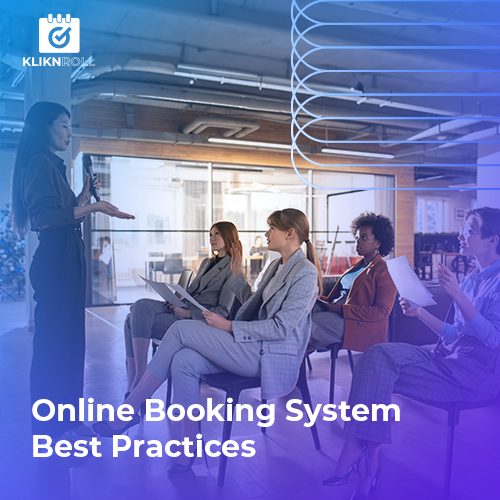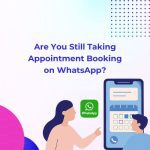Table of Contents
Benefits of an Online Booking System for Business Growth
An online booking system is a valuable tool for business growth, that is beneficial for both customers and business owners. It provides insights into customer behavior and allows for targeted marketing and personalized offers.
All this allows you to tune your booking system and make it convert the best, thus increasing the number of bookings you have while keeping the cost per booking the same.
Automating certain processes like timeslot allocation and calendar management, improves operational efficiency and resource management.
Additionally, booking systems offer 24/7 booking availability and cater to customers’ needs, especially in service-based industries like dentistry and plumbing.
One of a scheduling system’s biggest advantages is scalability. With automated organization, businesses can effortlessly handle more bookings and keep everything synchronized on their calendar and CRM systems.
Best Practices & Tips for Your Online Booking System
Make It Easy for Customers to Access Your Booking System
The first tip that we’re going to cover is to simply make sure that your booking system is easily accessible to any potential customers.
This means it has to be web-based and can be accessible for all customers, using any device.
Many business owners get enticed by the idea of an app-based booking system, which sounds nice in practice but is a nightmare in reality.
Not only will you have to develop 2 versions of the app (Android and IOS), but you’ll leave out consumers who prefer to book using their computers.
As a result, having a web-based booking system is a must. Ideally, you should make sure that it’s accessible to everyone without restrictions.
Some systems will require users to make an account and log in to use them, which is a turnoff and will probably result in people clicking out. Instead, give users an option to log in to earn rewards if they choose.
The key is to provide a win-win situation, where businesses can fill out member profiles with data, and customers can earn rewards or discounts.
Implement Smart Offers During Key Phases of Booking
A good practice to follow is to implement smart offers and strategic upsells during key phases of the booking process. The role of these offers is to organically upsell and cross-sell services.
Keep in mind that this only works if you personalize, tailor the experience for each customer, and make sure the complimentary service makes sense.
For example, if you’re running a hair salon, an easy upsell would be recommending a wash or a massage alongside a basic cut.
According to our own data, the key phases of upselling would be when customers select the services they’d like to book, and the final confirmation process.
This is when customers are most receptive to upsells and could be a big revenue booster when done correctly.
Keep in mind, however, that customer experience is very important, and ‘spamming’ your customers with offers deteriorates the user experience and will do more harm than good!
Connect a Loyalty Program to Your Booking System
If your business already has a loyalty program in place, integrating it with your booking system can provide more information about the behavior of your most loyal customers.
This integration can honestly be as straightforward as allowing customers to log in and accumulate points.
By offering this option, you gain an additional layer of data to analyze, such as preferred services, booking frequency, and average spending per booking.
This data can be used to create personalized marketing campaigns via email or text messages.
For example, you can offer discounts on future bookings of a particular service if customers schedule multiple appointments in advance, thereby potentially increasing customer retention rates through your booking platform.
Always Prioritize the Mobile Experience
It goes without saying that your booking system should be optimized for mobile, as about a third of customers book their appointments using their phones, overshadowing computers and laptops.
That is why it’s increasingly important to prioritize the mobile experience. If you’re unsure where to start, you can take a look at the Google Analytics of your website and see what is the most popular device used.
If you find that the majority of your users are using iPhones and are using Safari as your preferred browser, perhaps it’s a good idea to prioritize optimizing your booking system for iOS and Safari.
Set Up Tracking, Optimize & A/B Test
It goes without saying that data is important, not just for a booking system but for business in general. Here are some data to keep track of in your booking system:
- Average Engagement Time
- Customer Frequency Value Uplift Ratio
- Customer Churn Rate
- Button CTR
- Bounce Rate
After collecting and analyzing data, identify any issues customers may be facing.
This could include confusing button placements or an overall lack of user-friendliness in your booking system.
Once you’ve pinpointed the problem areas, it’s time to optimize. However, it’s best not to overhaul everything at once, if possible.
Instead, focus on changing one element at a time. This approach lets you conduct a thorough root cause analysis of each issue and make targeted improvements.
When using this step-by-step approach, you gain valuable information that helps you avoid repeating the same mistakes on other aspects of your booking system.
Use Multiple Channels to Send Reminders
Automated reminders are key components of virtually any online appointment system, commonly sent via email and text messages.
While these methods are great, it’s beneficial to diversify your reminder channels whenever possible.
In addition to emails and texts, businesses can leverage platforms like Facebook Messenger, Instagram Chat, Google Calendar Reminders, WhatsApp, WeChat, and more.
However, your choice of channels should take into account where customers discover your business and their privacy preferences.
In our experience, platforms like Facebook Messenger and WhatsApp yield excellent results for automated reminders, as they are frequently checked compared to emails and texts.
If opting for these channels, using a business profile is advisable to enhance trust and minimize the risk of customers perceiving messages as scams.
Ensure Your Booking Process Involves as Few Steps as Possible
For your online booking system to thrive, it’s crucial to streamline the booking process, making sure it is simple and quick for customers to complete. The attention span of an average consumer has dropped to 8 seconds. As a result, having a straightforward process is important.
From our experience, many clients tend to overwhelm customers by requesting too much information, particularly when they want to fill up customer profiles in their CRMs. This can deter new customers from completing their booking.
To hone this process, only ask for essential details like full names, phone numbers, and email addresses.
Keep the number of pages to a minimum; customers are likely to lose interest if faced with a lengthy form spanning six pages. Ideally, aim for a maximum of four pages for your online booking system, not including the terms and conditions.
For added user-friendliness, consider including a page indicator at the bottom, such as “Page 3 out of 4,” to guide customers through the process and encourage completion.
Make Sure Branding is Consistent
Branding is another factor that you should keep in mind as a best practice. Since this platform will likely be your primary source of bookings and revenue, why not take the effort and make sure it reflects the best of your brand?
Branding here revolves around the visual elements of the platform. Does it align with your brand’s colors, imagery, and voice? Good branding isn’t just about aesthetics; it directly influences how customers perceive your brand.
Take Starbucks, for instance—they’ve cultivated an upscale image through consistent branding across all touchpoints, from their online apps to their physical stores. This consistent branding gradually shapes people’s perceptions of the brand.
You can achieve a similar impact with your online booking system. By maintaining cohesive branding, you can encourage customer loyalty and set yourself apart from competitors!
Reward Customers Who Use Your Booking Systems
A great online booking system not only encourages customers to come back but also rewards them for their ongoing business. This ties into the loyalty program idea mentioned earlier, but it can also be a standalone strategy.
You can consider offering vouchers or discount codes to customers who book through your online system.
This not only leaves a lasting impression but also gradually motivates them to use your booking platform regularly, saving you time and hassle compared to handling phone bookings.
While these discounts may seem like a short-term loss, they serve as a “loss leader,” ultimately leading to long-term gains.
Think of it as investing in customer retention rather than constantly seeking new customers. Research shows that loyal customers tend to spend more over time, making this strategy a worthwhile investment!
Customer Experience is the Most Important Factor
Lastly, the very best practice you can ever have for any online booking system is to have the best customer experience possible.
All of the points that we’ve mentioned earlier come from customer experience. They’re not going to complete the booking if your booking system doesn’t have the look and feel they’re expecting.
Make it easy and convenient for your customers and they will return the favor by giving you more bookings and staying loyal!
How Do You Get More Online Bookings?
To get more online bookings, start by fine-tuning your conversion process. Figure out what’s causing customers to hesitate or abandon bookings, then tweak elements like button design and booking steps to make the process smoother.
These changes can boost bookings even if your website traffic stays the same, whether it’s from search engines or ads.
Another key is to strengthen your brand presence. Engage with your audience on social media, share valuable content, and ensure your branding is consistent across all platforms. By building trust and familiarity, you’ll make users more likely to book with you.
Another helpful strategy is investing in SEO (search engine optimization). When people search for services on platforms like Google, they’re often ready to book. Your task is to show them why your business is the best choice.
By improving the quality of your website traffic and attracting users with strong purchase intent, you can increase bookings organically. This approach can be more effective than relying solely on paid traffic, which may not always lead to immediate bookings.
If you want a scheduling software that helps you get more organic bookings, check out our online booking system (Click2Book) to find out more!

Hey there! I’m Jeffrey Hau, and my journey in the digital world started after I wrapped up my psychology degree at UCLA. Imagine coming back to the bustling streets of Hong Kong from the tech haven of Silicon Valley – it was a whirlwind of inspiration! Seeing how social media platforms were evolving at breakneck speed and realizing the limitations of traditional advertising in this digital age, I decided to dive in.
In 2012, I laid the foundation of Prizm Group. From our humble beginnings, we’ve now blossomed into a global powerhouse with a team of over 200 passionate professionals. Our HQ is right here in Hong Kong, and we’ve spread our wings to SG, AU, NZ, JP, and China.
As a digital problem solver, our team found that several industries are in need of reservation systems, especially for F&B, Hotels, Beauty, and Medical sectors. Our digital magicians started crafting reservation systems tailored to cater to these specific needs. We extended our expertise to e-commerce, voucher management systems, and campaign management systems, combining them into KlikNRoll – an all-in-one solution. We deep dive into various industries, understanding their unique challenges and developing innovative solutions.
We’re not just a company; we’re your dedicated partners in transforming how you navigate the digital landscape. Our passion lies in providing businesses with intuitive and tailored solutions using KlikNRoll’s powerful capabilities.
Ready to embark on this exciting digital adventure with us? Let’s make your brand stand out in the digital jungle!






